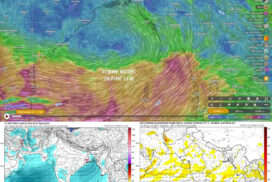The 2024 World Meteorology Day, themed “At the Frontline of Climate Action,” aims to urgently address climate change and its repercussions in alignment with Sustainable Development Goal 13. Meteorology is integral to the daily lives of people across various societies, especially in business operations across sectors that heavily rely on meteorological insights for decision-making.
The Department of Meteorology and Hydrology, operating under the Ministry of Transport and Communications, provides daily forecasts nationwide, catering to the needs of diverse sectors such as agriculture, livestock, transportation, and fisheries. These forecasts not only assist in business decisions but also find application in various work processes, significant events, and ceremonies, aiding individuals in overcoming daily challenges.
In addition to routine weather monitoring, individuals must also remain vigilant regarding phenomena like El Niño and unforeseen weather fluctuations. The efforts of the World Meteorological Organization (WMO) community are indispensable in addressing climate action and Sustainable Development Goals, encompassing vital societal aspects like hunger and poverty reduction, healthcare improvement, water and energy accessibility, biodiversity conservation, and climate resilience in communities.
Weather and climate predictions significantly contribute to enhancing food production and progressing towards the objective of zero hunger. Integration of epidemiological and climate data facilitates understanding and management of climate-sensitive diseases. Furthermore, early-warning systems for extreme weather events play a crucial role in poverty alleviation by enabling proactive preparedness and minimizing the impact of adverse weather conditions.
It is imperative to enhance public awareness regarding the broader applications of weather forecasts, including climate change implications, global warming, temperature variations, erratic precipitation, and their correlation with phenomena like El Niño. By leveraging meteorological insights and fostering public understanding, societies can better adapt to evolving environmental conditions and work towards a sustainable future. In fact, everybody does not have a chance to deny the treatment of climatic conditions over all living beings across the world.
Weather forecasts extend beyond mere convenience; they are indispensable tools in addressing the challenges posed by climate change. Through effective utilization of meteorological information and heightened awareness, societies can mitigate the impacts of climate change and advance towards a more resilient and sustainable future.
It is necessary to raise public awareness to broaden the scope of knowledge about weather forecasts. Moreover, people have to apply predictions on climate change, global warming, high day temperatures, untimely rain and strong winds based on impacts of El Nino, and other significantly unusual situations.
Monitor weather forecasts in daily routine
- March 24, 2024
- 134














